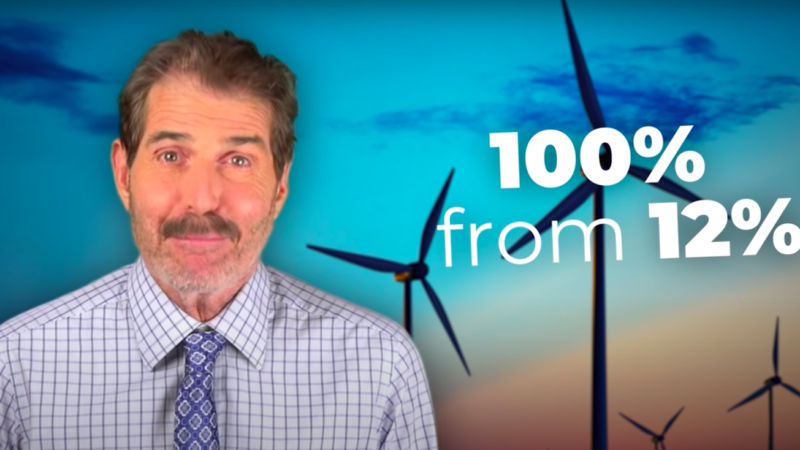
The "Greens" promise renewables, solar and wind power, will replace fossil fuels. After all, the wind and sun are free, and they don't pollute!
Oops.
Now countries that embraced renewables are so desperate for power that they eagerly import coal, the worst polluter of all!
Do they apologize? No. Greens never apologize.
Germany was a leader in renewable energy, so confident in solar and wind power that they closed half their nuclear plants.
Oops.
That leaves Germans so short of power that Germans are now desperate to buy fossil fuels from Russia. Even worse, pollution-wise, high pollution coal now tops wind as Germany's biggest electricity source. That's really disgusting.
Then, even after putting all that soot in the air, Germans pay more than triple what Americans pay for electricity.
For my new video, I confront German-born environmentalist Johanna Neumann of Environment America, a group that lobbies for 100 percent renewable energy.
I point out that despite massive subsidies, her beloved renewables still provide just 12 percent of our power. She responds, "Saying renewables are not yet powering our utility grid is like critiquing a 2-year-old for not being able to run a marathon."
A 2-year-old? I don't want to meet that kid. Renewables have been subsidized for 40 years, not two.
"How we spend our taxes ought to be a reflection of our values," Neumann adds. "Americans…love renewable energy."
Yes, I suppose we do. We like the idea of it. I put solar panels on my roof. I'd be a sucker not to. Massachusetts takes money from other state residents to give me a tax break on solar panels.
Still, in winter, when the sun is low, or my panels are covered by snow, I get nothing from my solar panels.
What kind of energy solution is that? People need energy when it's cloudy, too. They also need it when the wind doesn't blow.
"When the sun goes down…offshore winds get cranked up," says Neumann.
No, they don't!
"The wind doesn't always come up when the sun goes down," I point out.
"Renewables are clearly better," Neumann replies.
She says we'll solve renewable energy's inconsistency by doing things like storing energy in batteries.
Well, yes, a battery that holds energy for weeks would make renewables work. But it doesn't exist.
"This is just a total fantasy, which is why nobody has done it anywhere, ever!" says Alex Epstein, author of The Moral Case for Fossil Fuels.
Fossil fuels are moral, Epstein correctly points out, because human flourishing depends on them.
Abundant fossil fuels are especially important for poor people.
"Three billion people in the world still use less electricity than a typical American refrigerator. Are we going to allow them to have a modern life? Because that's going to depend on fossil fuels."
Even if climate change becomes a serious problem, fossil fuels reduce its harm by making us prosperous enough to afford protection against the climate.
"We have a 98 percent decline in climate-related disaster deaths over the last 100 years," Epstein points out.
A 98 percent drop in deaths! This is the amazing untold story of fossil fuels and their benefits. Because oil and natural gas so efficiently provide power, heat homes when it's freezing, pump water during droughts, etc., millions thrive, despite problems like climate change.
Thanks to fossil fuels, "We have this amazing productive ability," says Epstein. "That's the only reason we experience the planet as livable."
Global warming is a threat. Limiting fossil fuels now, without a capable alternative, will make it even harder to deal with the effects.
Unless someone invents a miracle battery or something else that makes sun and wind power practical, we need fossil fuels, desperately.
Poor people need them most.
COPYRIGHT 2022 BY JFS PRODUCTIONS INC.
The post Fossil Fuels Save Lives appeared first on Reason.com.







